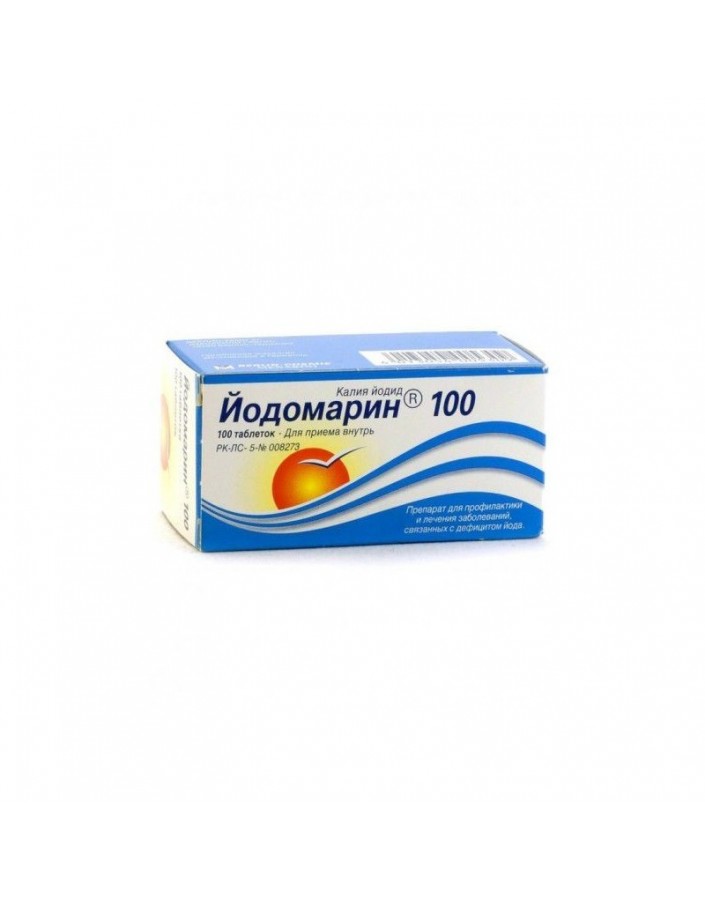




Security policy (edit with Customer reassurance module)

Delivery policy (edit with Customer reassurance module)

Return policy (edit with Customer reassurance module)
| pharmachologic effect
Iodine-containing drug, compensates for Iodine deficiency, stimulates the synthesis and release of TSH. It prevents the accumulation of radioactive iodine in the thyroid gland and ensures its protection against the action of radiation, and prevents the development of hyperplasia of the thyroid gland. Iodine, secreted by the mucous membrane of the bronchi, causes its reactive hyperemia, increased secretion of the liquid component of sputum and improves its expectoration. It has an antimicrobial effect. Reduces lipid deposition in arteries. Absorption is fast and complete. Plasma concentration is 0.1-0.5 mcg / dl. It is mainly absorbed by the thyroid gland, where it is oxidized to iodine. Substrately provides iodination of tyrosine in the thyroid gland with the formation of mono - and diiodotyrosine. Also accumulates in the salivary and lactating mammary glands, tissue of the stomach (the content in saliva, milk and gastric juice exceeds the plasma level 30 times). Excreted by the kidneys, in part - the bronchial, salivary and mucous glands. Indications and usageEndemic goiter. Prevention of the development of diseases caused by iodine deficiency (endemic goiter, during pregnancy, after resection of goiter caused by iodine deficiency). Prevention of damage to the thyroid gland under the influence of radiation. ContraindicationsHypersensitivity, hyperkalemia, severe or latent hyperfunction of the thyroid gland (including diffuse and nodular toxic goiter), toxic adenoma, etc., benign tumors of the thyroid gland, Durring herpetic dermatitis, pulmonary tuberculosis, nephritis, nephrosis, pregnancy (with the exception of the threat of admission radioactive iodine, administered together with potassium perchlorate), the lactation period (at doses above 300 μg / day). Inside, after eating, with plenty of liquid. For the prevention of goiter with iodine deficiency: adults and children from 12 years old - 100-200 mcg / day, children under 12 years old - 50-100 mcg / day, pregnant and lactating breasts - 150-200 mcg / day. Prevention of relapse after drug treatment of iodine-deficient goiter - 100-200 mcg / day.After surgical treatment of goiter in newborns, children and adolescents - 100-200 mcg / day. Goiter treatment for adults and children from 12 years old - 300-500 mcg / day, for children up to 12 years old - 100-200 mcg / day. With endemic goiter - 40 mg once a week. With diffuse goiter - 40 mg 3 times a day, then 125 mg 1-2 times a day in courses for 20 days, with intervals of 10 days. Adverse reactionsPhenomena of iodism: rhinitis (swelling of the nasal mucosa), eosinophilia, fever, urticaria, angioedema, dyspepsia, gastralgia, diarrhea, hyperkalemia, tachycardia, sleep disturbances, hyperhidrosis, salivary gland swelling, acne, shock; hyperthyroidism (at doses above 300-1000 mcg / day), hypothyroidism (with high-dose therapy - more than 1 mg / day). Special notesLong-term treatment with doses of more than 1000 mcg iodine per day causes a decrease in iodine uptake by the thyroid gland and the synthesis of thyroid hormones, which later manifests itself in the form of hypothyroidism and the onset of goiter. In pregnancy, use is possible only in recommended doses, since iodine crosses the placenta and can cause the development of hypothyroidism and goiter in the fetus. Iodine is excreted in breast milk, so when used during lactation in doses of more than 1 mg / day, there is a risk of hypothyroidism in an infant. During therapy, patients with renal insufficiency may develop hyperkalemia. Drug InteractionsThe inclusion of iodine in the thyroid gland is suppressed by perchlorate and thiocyanate (at concentrations in the blood exceeding 5 mg / ml) and stimulated by TSH. Simultaneous use with potassium-sparing diuretics can lead to hyperkalemia; with drugs Li + - the development of goiter and hypothyroidism. Antithyroid drugs weaken the effect (mutually). |